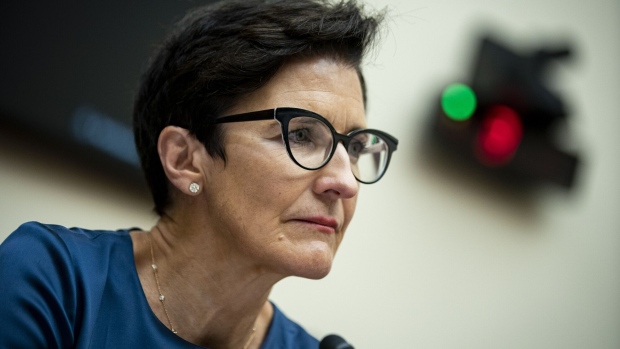Nov 3, 2023
Citigroup Weighs Shutting Once Dominant Muni Business
, Bloomberg News

(Bloomberg) -- Chief Executive Officer Jane Fraser is weighing whether to shutter Citigroup Inc.’s municipal-bond trading and origination business, which for decades was a powerhouse in the $4 trillion market for US state and local debt.
Senior executives in favor of closing it down have presented the proposal to Fraser in response to her push to bring the firm’s profitability in line with its competitors, according to people familiar with the matter. No final determination has been made and the CEO could still elect to hold on to the business.
Political ramifications may factor into the decision, the people said, asking not to be identified discussing internal deliberations. Banks often point to their work raising money for cities and states when facing scrutiny from local and federal politicians, and a decision to exit such a business could invite blowback.
The debate shows just how far Fraser is willing to go to improve Citigroup’s returns, which have long lagged behind Wall Street’s other top banks. She has already moved ahead with plans to jettison more than a dozen retail-banking units in overseas markets and initiated the biggest restructuring of Citigroup in decades as she whittles down the company’s byzantine management structure.
The business of underwriting bonds for state and local governments has been thrust into the spotlight by Texas and several other Republican-led states that have picked fights with Wall Street over policies that limit work with the gun and fossil-fuel industries. Earlier this week, JPMorgan Chase & Co. CEO Jamie Dimon warned Texas that the state risks undermining its business-friendly reputation by pushing anti-business laws.
The debate at Citigroup is focused on how profits from the muni operation have been a laggard, and is not a response to political confrontations in Texas, the people said. The costs associated with the business don’t always justify the revenue it brings in, one of the people said.
Read More: Fed-Up Fraser Turns to Downsizing to Cure Citi’s Painful Slump
It’s a notable fall for the bank’s municipal-bond business, which spent years near the top of the league tables and ranked No. 2 as recently as 2021. Since then, Citigroup has tumbled in the rankings for underwriting state and municipal debt. The Wall Street giant has fallen to eighth place this year, according to data compiled by Bloomberg.
A representative for the New York-based company declined to comment on deliberations about the the muni-bond business.
While the brewing controversy in Texas was not the reason for Citigroup to begin deliberating the future of the municipal business, it didn’t help. Being frozen out of Texas deals has further crimped the unit’s revenue, thereby hurting overall profitability, the people said.
Just three years ago, Texas deals accounted for 14% of Citigroup’s municipal-bond volume, according to data compiled by Bloomberg. Fraser, for her part, has sought to rekindle her bank’s business in the state. In August, she and Ed Skyler, Citigroup’s head of enterprise services and public affairs, traveled to Texas to meet with Governor Greg Abbott about the bank’s continued commitment to the state.
Last year, Citigroup revamped parts of the group’s trading and banking units, closing its muni proprietary-trading operation, which used the firm’s own cash to trade and invest. The company also offered buyouts to more than a dozen senior traders, bankers and salespeople, which spurred further departures across the group.
Fraser, as part of her bid to boost profits, has pledged to be dispassionate when it comes to ditching or rejiggering businesses that don’t meet the firm’s targets for profitability. She’s looking to lift a key measure of profitability known as return on tangible common equity to at least 11% by 2027 at the latest. Many of her rivals are already notching returns much higher than that: JPMorgan’s figure stood at 23% in the first nine months of 2023. At Bank of America Corp., that ratio was 16%.
“When I became CEO, we began immediately with refreshing our strategy, laying out the new vision for the firm in order to transform Citi into a simpler bank and to unlock the full value potential and to deliver higher returns in the medium term,” Fraser said at an investor conference in September. “I had a very clear-eyed assessment of exactly where we stood versus our peers, but also the issues that have held us back over the years.”
--With assistance from Martin Z. Braun and Danielle Moran.
(Updates with additional information about Texas business in ninth paragraph.)
©2023 Bloomberg L.P.







